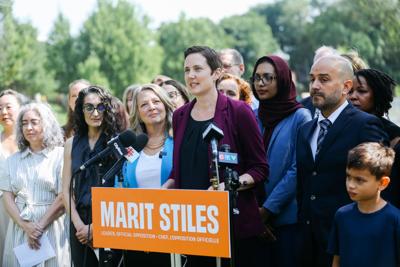Along with the responsible use of artificial intelligence, combating racism and keeping kids safe, one of the mandatory professional activity days for educators in the coming year must cover the school resource officer program, according to a memo from the provincial government.
The controversial police-in-schools initiative is not offered at every board┬ĀŌĆö ╬┌č╗┤½├Į’s police chief has said there are no plans to reinstate it in the city┬ĀŌĆö but the memo, sent out Tuesday by Education Minister Paul Calandra and Deputy Minister Denise Cole, says in those that do, a “summary of the program’s structure and objectives” should be included. School resource officers must be covered in all boards, even if they don’t run the program.
Activities, they wrote, should contain “information about the role of police in providing high-quality, age-appropriate educational public safety presentations to students on subjects such as cyber-crime, human trafficking, road safety and other areas of local importance. Information should also be provided about the role of police in the school community, to support trust building between educators, policing services, students and parents/guardians.”
The memo, obtained by the Star, says the topic is meant to “support enhanced school board/police partnerships.”
It also says schools need to work “co-operatively with police partners” on the two yearly lockdown drills, keeping staff up to date on procedures┬ĀŌĆö and “consider adding a bomb threat drill as part of their emergency evacuation drills and that school personnel should work co-operatively with police partners on these drills.”
School staff, it also says, “should be familiar with the role of police in delivering age-appropriate public safety education on topics such as cybercrime, human trafficking and road safety.”
The four themes to be included over the provincially directed professional activity days “reflect the governmentŌĆÖs focus on a strong, accountable education system that prioritizes student achievement ... The topics have been carefully selected to ensure a consistent and focused approach that supports greater coherence and impact across the province.”┬Ā
There are seven professional activity days a year, with the ministry mandating topics for three of those days.
Boards can determine how much time they spend informing staff on the school resource officer program.
NDP education critic Chandra Pasma said she’s unsure how the PA days will work in boards that don’t have the school resource officer program┬ĀŌĆö including in ╬┌č╗┤½├Į, where the public board voted to put an end to it in 2017.
At the time, the board said while “many students had a positive impression of the program, a number of students said the presence of a (school resource officer) made them feel uncomfortable, intimidated and/or watched or targeted.”
The officers, armed and in full uniform, were placed in schools to build bridges between police and students, as well as enhance safety. A number of boards ran the program, and some have continued to.
However, according to┬ĀBill 33┬ĀŌĆö recent legislation introduced by the province that is expected to pass this fall ŌĆö if police services offer the program, school boards must take part.
The move has sparked protests in ╬┌č╗┤½├Į by those who say the program adversely affects racialized students.
“We have no school resource officer program (in Ottawa) anymore either┬ĀŌĆö it was removed by a vote of the board,” said Pasma, the MPP for Ottawa WestŌĆöNepean, adding that police services in the nation’s capital do “a lot of┬Ācommunity building outside of schools.”
Teachers and education workers “should be learning how to directly support students, not about the school resource officer program,” she added.
T.J. Goertz, a spokesperson for the Ontario Public School Boards’ Association, said “while this is an important issue for school boards and police services who are engaging in this program to get right, it will not be a program offered by all police services, so it may not be the best fit for a provincewide PA Day.”
For Martha Hradowy, president of the Ontario Secondary School Teachers’ Federation, said “a┬Ātop-down, one-size-fits-all approach doesnŌĆÖt work ŌĆö professional development must be meaningful, relevant and fairly compensated for every teacher and education worker.”┬Ā
Too often, she noted, “occasional staff are expected to complete mandatory training on their own time, without pay.”
The province needs to talk to teachers about what issues to cover, said Ren├®┬ĀJansen in de Wal, president of the Ontario English Catholic TeachersŌĆÖ Association.
ŌĆ£We value professional learning that is practical, evidence-based and connected to the real challenges and opportunities we see in the classroom,ŌĆØ he said.
ŌĆ£Without meaningful consultation with teachers, the ministry seems to miss that mark.ŌĆØ
A spokesperson for the ╬┌č╗┤½├Į Catholic District School board says the TCSDSB “plans to use this professional development day to review its Safe Schools Action Plan, along with all related safety policies and protocols, ensuring staff are up to date and prepared to support student well-being and respond effectively in emergencies.
“The Board will continue working in partnership with ╬┌č╗┤½├Į Police Services and school communities through the Neighbourhood Community Officer (NCO) program and SafeTO to help create safe, inclusive and welcoming learning environments for all students.”





























To join the conversation set a first and last name in your user profile.
Sign in or register for free to join the Conversation